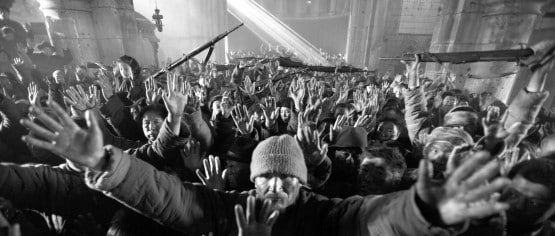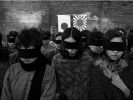Eye For Film >> Movies >> City Of Life And Death (2009) Film Review
City Of Life And Death
Reviewed by: Jennie Kermode

The Rape of Nanjing is sometimes referred to as the forgotten atrocity of World War Two. This is an odd notion, given how many thousands of people lost family members there, but cultural examinations of the war tend to be Eurocentric. Consequently, City Of Life And Death is being hailed as the definitive film on the subject, finally bringing it the attention it deserves. If this does result in greater understanding, that's a good thing, but in a way it's unfortunate that the film is seen in such restricted terms, because its picture of events at once encompasses much bigger themes and much more intimate human experiences.
The thing about war is that it's chaotic; most war films are contrived, to an extent, to work around this, either keeping their focus very narrow or having characters re-encounter one another in a string of unlikely coincidences. This film takes a different approach and simply plunges us straight into the middle of things, as if we were caught up in the conflict ourselves, with no real idea what's going on. Interestingly, we don't really know whose side we're on either. It's easy to ally with the brave Chinese resistance fighters still seeking to defend their people at great personal risk, but at first the Japanese soldiers seem so vulnerable, so few in number as they scatter through the urban ruins, that we feel for them too.

This is where City Of Life And Death finds its power. It has been criticised by the Chinese for not depicting the horrors of the occupation as brutally as accounts recall, and by some Japanese people for taking as truth certain events still the subject of controversy, but it's less interested in these political concerns than in the human stories of those who lived through it. We don't see everything because, well, one wouldn't expect to. What we do see will be more than enough for some viewers. Rather than pursue a nationalist agenda, director Lu Chuan searches for humanity in all his characters, and all his characters are flawed.
Kadokawa (the superb Hideo Nakaizumi) is a young soldier whose accidental killing of civilians almost breaks him; from that point he staggers through the story in a state of gradual disintegration, desperately wanting to stop the violence but not knowing how. His colleague Ida (Ryu Kohata) distances himself through casual acts of savagery but cannot help forming strong attachments to Chinese people he actually gets to know.
Meanwhile John Rabe (John Paisley), a man believed to have saved over 100,000 Chinese lives by helping refugees, is presented as a complex man still under the thumb of his Führer, doing what he can but making compromises all the way along. His secretary Mr Tang (Wei Fan) makes a terrible bargain to try to protect his family, but a charming photograph taken before the war reminds us of his sheltered middle-class origins and just how out of his depth he is. Then there's Xiao Jiang (Yiyan Jiang), a prostitute used to attracting disapproval, who is unexpectedly willing to sacrifice herself for others; there's Miss Jiang (Yuanyuan Gao), a missionary teacher just discovering what her mission means; and there's Lu Jianxiong (Ye Liu, fiercely charismatic in an almost silent role) as the film's only truly heroic character (which doesn't bode well for him).
In the background, wandering through these tangled lives, is Xiaodouzi (Bin Liu), a moon-faced child whose apparent irrelevance is often all that keeps him alive - yet it is through Xiaodouzi that we encounter repeated instances of kindness and humour sustaining something ultimately far more important than the triumph of Japan or the valour of China. For the first half hour of the film you may well find yourself completely lost, skipping from one character to another without knowing where to anchor yourself; only Xiaodouzi is quietly omnipresent. Again and again, Lu Chuan allows viewers to become attached to someone only to have them brutally, often pointlessly killed. It's a brutalising tactic, setting the tone for a still more forceful narrative centered on the city itself.
Perhaps what is most startling about Lu's Nanjing, in retrospect, is how modern it is. Though most of the buildings have been reduced to rubble by shelling, we see the vestiges of a hospital, a church, a school. We see civilian cars and bicycles. The very last moments of the film remind us abruptly just how recent all this was. It's an important perspective, forcing us to ask ourselves if we would have coped any better. Confused Japanese soldiers confront thousands of civilians and have no real idea what to do with them. They have nowhere to put the prisoners of war and they're clearly afraid that they could still be overwhelmed by an uprising. But then we see the mass executions by firing squad, the driving of prisoners into sea, the burials alive. We see severed heads hanging from a tree, a woman's half-naked and mutilated body lying by the side of the road. It suggests something animalistic, very far from the carefully cultivated self-image of Japanese society at the time. Toward the end, a ritual victory dance to pounding drums sees soldiers move like animals, crying out like animals, as cruel, as dangerous, as raw, as scared.
For all its artistry, the film has weak points. Some of these are purely practical. Information about the bigger picture is delivered through glimpses of postcards and notes, but they rarely stay on screen long enough for the viewer to fully decipher the handwriting. In other places the confusion is so great that we can't tell what's happening to whom even when the story requires that we should. Still, for all its waywardness, this sweeping narrative has a surprising power to keep the viewer hooked. City Of Life And Death is more than just a slice of history - it's an exploration of human nature, of the relationship between individuals and crowds (and nations), and of the choices we must all ultimately make in order to carry what truly matters into the future.
Reviewed on: 14 Apr 2010


















